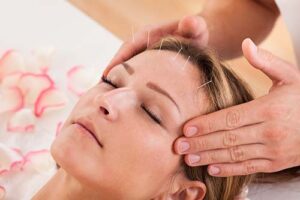 The Chinese healing practice called acupuncture has been around for 3000 years. Proven to be one of the most effective medical treatments for a vast range of illnesses and disorders and a practice that increases overall health and improves immune systems, this Chinese modality has become an essential piece of the Western health and wellness landscape. Acupuncture has been used in addiction therapy programs for about 50 years since its efficacy in this area was first discovered at New York’s Lincoln Memorial Hospital during the 1970s.
The Chinese healing practice called acupuncture has been around for 3000 years. Proven to be one of the most effective medical treatments for a vast range of illnesses and disorders and a practice that increases overall health and improves immune systems, this Chinese modality has become an essential piece of the Western health and wellness landscape. Acupuncture has been used in addiction therapy programs for about 50 years since its efficacy in this area was first discovered at New York’s Lincoln Memorial Hospital during the 1970s.
If you are interested in finding an addiction rehab program offering acupuncture therapy and addiction treatments from other medical and psychiatric traditions, consider Apex Recovery in Nashville. Our acupuncture treatment program provides a multi-faceted approach to detox and rehab for substance use disorders (SUDs). Contact Apex Recovery Nashville at 615.703.4639 to learn more about acupuncture therapy and addiction treatment in Tenessee.
What Is Acupuncture Therapy?
Acupuncture is an essential aspect of traditional Chinese medicine. It involves the insertion of fine needles into the skin by expertly trained practitioners. These practitioners place the needles, which most people do not feel, along the body’s meridians or energy pathways. There are more than 2,000 acupuncture points in all body parts, from the tips of your toes to your scalp.
When acupuncture is used in treating addiction, it can be used both during medically supervised detox and throughout rehab. It can also support successful long-term recovery by helping you manage stress, cravings, and mental health challenges such as depression and anxiety.
Acupuncture Treatment Program for Addiction
Acupuncture is proven to reduce or eliminate symptoms such as muscle or joint pain, nausea, headache, dizziness, and more. It can lower blood pressure, ease neuropathy symptoms, and help with breathing issues—many of these are present during drug and alcohol withdrawal. Acupuncture points in the ear are particularly effective in easing withdrawal symptoms.
Post-detox, the continued efficacy of acupuncture for your recovery may rely on some or all of the following:
- Acupuncture is a non-substance way to manage chronic pain. If you became addicted to painkillers or have abused drugs to handle pain, you can manage your pain without medications throughout your recovery, thanks to acupuncture.
- Acupuncture also can manage mental health symptoms. Once you are sober and your mental health is addressed, ongoing acupuncture, in combination with therapy and safe medication, can help you maintain your mental balance by reducing your reactivity to stress triggers and avoiding intrusive thoughts, anxiety, depression, and more.
- Acupuncture helps your body to return to a state of balance, regardless of the system. It can amplify the efficacy of the endocrine system, the digestive tract, the heart and lungs, circulation, and many other bodily systems, organs, and functions. When you are in a state of balance, you are less likely to be easily triggered to relapse.
- Acupuncture prompts the release of feel-good brain chemicals like endorphins. Acupuncture helps your brain take up its job of producing the neurotransmitters you need to feel pleasure and contentment—a job that drugs and alcohol took away from it by overwhelming the whole system. You no longer need to depend on substances to feel good. People report a profound sense of well-being during and after an acupuncture session.
- Acupuncture is widely accepted as a productive part of addiction treatment.
